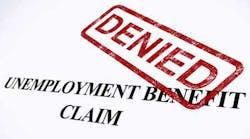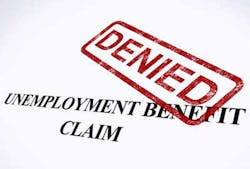Contesting an unemployment claim by a terminated employee can be a lengthy and expensive process. You may feel the employee does not deserve unemployment benefits because you found the employee’s actions intolerable. However, generally your state’s unemployment office will demand evidence that before the termination, you showed a high degree of patience and effort to retain the employee. Without written proof of specific actions you took to avoid the termination, the unemployment office is not likely rule in your favor.
1. You terminate the employee
2. The employee files for unemployment benefits
3. You receive notice of the claim
4. You challenge the claim|
5. The state’s unemployment office interviews you over the phone
6. If they decide in favor of the employee, you request a hearing
7. You attend the hearing in front of an administrative judge who makes a final decision.
RELATED READING:Controversial layoff letter of dental assistant with cancer: What NOT to do
Keep in mind that you do not pay for unemployment claims directly out-of-pocket. Unemployment payments operate like a general tax on all employers. The more unemployment claims you have against your business, the higher your unemployment “tax” will be. If you have fired many employees, your business will likely see a jump in your payroll unemployment expenses, and contesting the claims may be the best use of your time. If you have high unemployment costs, you should focus your efforts on improving your hiring process, training methods, and workplace environment. Contesting unemployment claims is just a band aid to a much larger problem.
There are some preventive measures that all dental and medical practices should take to avoid paying claims. First, document everything. While it’s extremely important to document the problems, you will also have to show proof of your efforts as an employer to keep the employee. In order to properly establish good cause for termination, you will have to show the judge that you put significant effort into helping the employee improve his or her performance. You will also have to show how the employee’s behavior had a significant impact on the overall performance of the business.
For example, if your practice had a receptionist who was always late, you will have to show proof that he/she was often late. Moreover, you will have to show documentation of the multiple meetings you had with the employee to discuss the problem. You will also have to show your efforts to adjust the business to make reasonable accommodations for the employee. For example, if the receptionist was always 10 minutes late because of a conflict with his or her childcare center, the court will expect you to have made a scheduling adjustment for the sake of childcare. Perhaps that seems unfair to you as a business owner. However, the state will side strongly with the terminated employee, especially in cases involving childcare, health care, and disabilities.
The hearing officer may also request proof that a late employee caused damage to the business. If the receptionist was the only person to open the office in the morning, you could show the judge a log of missed phone calls. However, if he or she was an hourly employee, and simply lost 10 minutes off his or her time card (as opposed to logging in 10 minutes late), there are few to no tangible losses to the business.
Less severe problems such as an irritable personality, errors in work, or a lack of skills generally will not provide you with enough evidence to show good cause for terminating an employee. The state will see these issues as avoidable. Either you could have screened out the employee prior to hiring, or you could have made efforts to train the employee and improve his or her performance.
You can always be strategic in your efforts to reduce successful unemployment claims. Because the claims process is lengthy and complicated, there is nothing illegal about denying every claim and requesting a hearing for every employee who files for unemployment benefits. While there may be a moral struggle – you will have to face knowing you are denying much-needed money to your former employees – you have the legal right to demand that former employees jump through the litany of hoops necessary to get their benefits.
The most time-consuming part of the process is the in-person, administrative hearing. Prepare your evidence well in advance and have a lawyer review the case. If that seems too time consuming, you can skip that hearing. By simply contesting the unemployment claims, you are forcing the employee to live without an income for the many months it takes to get to that administrative hearing. As a result, by the time the hearing is finally scheduled, many of your former employees will have been forced to take any other job to make ends meet. Once they are gainfully employed, they won’t have the right to claim unemployment benefits.
A word of warning – if you repeat this process, you might catch the attention of an administrative judge who won’t take kindly to you wasting everyone’s time when you ignore the court date. In addition, your other employees will know about your strategic (and morally ambiguous) efforts to evade paying unemployment benefits. It is always beneficial in the long-run to have a team of trusting employees.
Running a dental practice means you will have employees, and with employees comes turnover. Because terminating employees always comes with risks, it’s clearly cost-effective and business savvy to be a transparent, honest, and dedicated leader. If you have more than two or three employees, unemployment claims are simply a part of doing business. But with the right strategies, you can level the impact of your bottom line.
ALSO BY ALI OROMCHIAN:Dental office worker misclassification
Ali Oromchian, JD, LL.M., is the founding attorney of the Dental & Medical Counsel law firm, and is renowned for his expertise in legal matters pertaining to dentists, veterinarians, optometrists, and physicians including, but not limited to, practice transitions, employment law, estate planning, partnership agreements, and lease negotiations.








